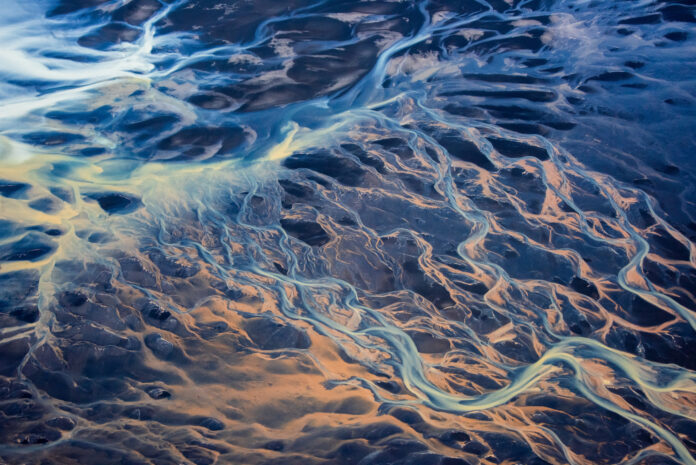While the replacement of actual film with digital technology remains a sticking point for some purists, the reality is that equipment sophistication and affordability have improved so quickly that it’s rare now to see a poorly shot movie. Even the cheapest, trashiest enterprises tend to look at least “professional,” which they didn’t used to, and efforts that are otherwise dumb or inept still often have impressive drone-enabled shots that would’ve been logistically impossible not long ago. Hell, projects shot entirely on cellphones can look terrific now.
All this has certainly upped the look of nonfiction cinema, traditionally if not always a rough-and-ready visual terrain. This week brings three nature-focused documentaries—a genre the aerial or even subterranean access drones afford can particularly benefit—which quite spectacularly bear that out.
The most informative among them, and of greatest local interest, is Trip Jennings’ Elemental: Reimagining Wildfire, which opens with a short survey of fire disasters over the last decade, and the then-POTUS’ solemn official responses. (Trump, articulate as ever, can come up with nothing better than calling the 2018 Paradise, CA catastrophe “a really, really bad one.”) We eventually learn that while the number of conflagrations in the western US have remained fairly stable, climatic conditions have greatly increased their escalation, scale of destruction, and resistance to containment. Drought conditions have generally been on the rise since the 1980s, while preventative forest management techniques have failed to change significantly in response to the resulting greater challenges.
Elemental does suggest solutions: Taking ideas from the Native peoples who once were the only human inhabitants in these regions, it proposes we fight fire with fire (i.e. controlled burns), as well as by using various means to “fireproof” residential homes and properties. Alongside harrowing footage of people fleeing fires that sometimes consume their towns whole, we see fascinating experiments to try out different firefighting methods, some as large and elaborate as movie soundstage illusions. The feature will screen this Sat/22 at 4:15pm (more info here) at the Smith Rafael Film Center, with onscreen interviewee Maya Khosla—a Sonoma County-based writer, biologist, and conservationlst—present to lead an audience conversation afterward.
Getting a wider local release on Wed/19 at the Rafael again and SF’s Opera Plaza (plus Berkeley’s Elmwood on Fri/21) is the National Geographic doc Wild Life from Jimmy Chin and Chai Vesarhelyi of The Rescue, Free Solo, and Meru. This time their focus is late entrepreneur-philanthropist Doug Tompkins, whose 2015 death after a rafting accident left his widow Kris carrying out the remainder of what had become his (and their shared) life’s work: Purchasing huge amounts of land in Chile in order to donate them back to that nation’s government, albeit as parklands protected from mining (Chile’s leading industry) and any other despoiling.
Before adopting that cause, Tompkins had with his first wife Susie Buell founded outfitting co. The North Face, which they sold, then clothier Esprit, which he shepherded to enormous international success. They eventually separated, as he became less interested in business and much more in “deep ecology.” Meanwhile future spouse Kris McDivitt burned out after 20 years similarly building up outfitter-clothier Patagonia Inc. for longtime climbing buddy Yvon Chouinard. Tompkins had grown smitten with the actual Patagonia region during backcountry climbing, skiing, and surfing trips as far back as the ’60s. He thought to preserve that increasingly trod-upon, mineral-extracted land with her assistance.
Chin himself is a famous mountain climber, and inevitably this is one of those films in which personal and professional borders blur a bit uncomfortably. Feeling rather like an authorized biopic, Wild Life flatters the Tompkins’ efforts, which in most respects are duly laudable. But there’s a sense that any unflattering matters get skimmed past or dismissed far too quickly. Those matters include one colleague’s observation “There was a part of Doug that was like an asshole,” and even more notably, many Chileans’ reluctance to have a wealthy American determine what is best for them, economically as well as environmentally. Wild Life is very well-made, but I’d have preferred it made perhaps by more disinterested parties than these directors, who seem to move in largely the same deep-pocketed, globe-trotting, brand-affiliated circles as the couple who are their subjects here.
Both Elemental and Wild Life have plenty of awesome landscapes and other sights to drink in. But for sheer eye candy, the cake is fully taken by Jennifer Peedom and Joseph Nizeti’s River. Willem Dafoe sonorously reads poetical voiceover narration to the strains of the Australian Chamber Orchestra (doing a pastiche of various classical composers) and Radiohead as five principal cinematographers—plus a whole lotta supporting ones—provide one stupendous image after another. Drone-shot, slo-mo, time-lapse, you name it, culled all over the world from glacier to Ganges.
The point of all this sensory overload is a pretty simple, if loftily articulated, “Water is life, so be mindful of Mother Earth”—or as Dafoe keeps putting it, “Look after the river, and the river will look after you.” Needless to say, mankind has almost irreparably broken that contract, between course diversions, dams, pollution and overpopulation. “We will be remembered for all that we have depleted, vanished and killed,” we’re told. (Remembered by who?) But the message is nonthreateningly vague, and the presentation like an endlessly jaw-dropping coffee table photography book for the screen—just as Koyaanisqatsi, Baraka, and similar enterprises were before it.
These movies definitely have their audience. But I always find them as hollow as they are gorgeous, a form of New Age eco-tourism that leaves you feeling high-mindedly virtuous without requiring anything more pro-active than wallowing in very pretty pictures. River is playing selected theaters on Earth Day, Sat/22 (venues are listed here), then will be released by Greenwich Entertainment to home formats on May 30.







